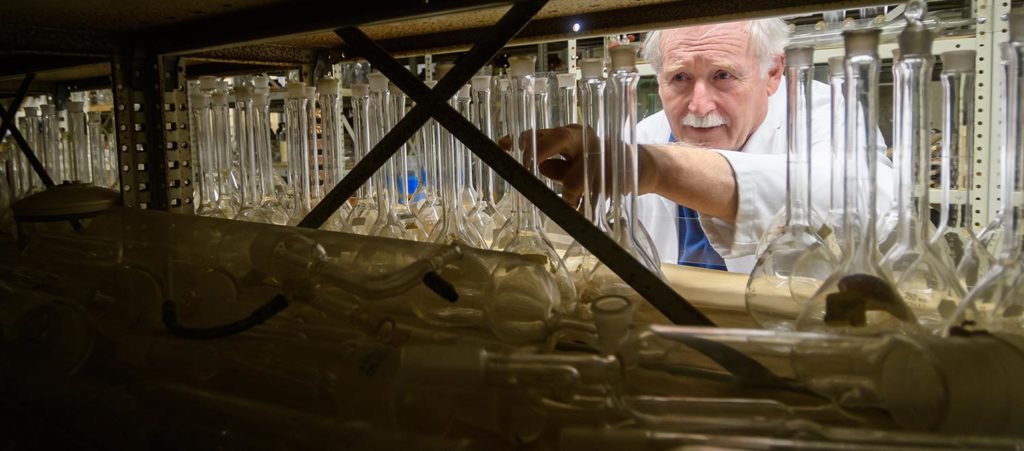
Frank Abell remembers the day his son visited his office on the first floor of the Arthur M. Sackler Sciences Center. Abell, Clark University’s laboratory manager/chemical safety officer, sat at his desk amid filing cabinets and boxes of supplies as students and professors rotated through. Undergraduates sought to buy white lab coats. Faculty researchers asked about orders of chemicals and equipment. Facilities staff and contractors checked in about the refurbishing of labs.
“Dad, I would like a job like this,” his son said. “Everybody depends on you.”
Keeping track of details and staying on top of best practices in chemical and environmental management and safety is a large part of Abell’s job at Clark. He compares himself to Radar O’Reilly, the colonel’s right-hand man in the long-running TV show “M*A*S*H.” Radar studiously maintained paperwork and kept things moving amid the chaos of the Korean War. “He always knew what the colonel wanted before the colonel asked for it,” Abell says.
A basketball player at UMass Amherst, Abell graduated with a degree in chemistry in 1969, and was drafted to serve in the Vietnam War. Instead of flying to Hanoi, he headed to Natick, Mass. The Army wanted his brain, not his brawn.
At Natick Laboratories, part of a still-operating 78-acre military research complex, Abell mostly tested K and C rations, the food kits for soldiers. He also helped develop clothing for all types of military applications. His favorite job was testing wet suits.
“They had a 16-foot pool, and I would lay in a chaise lounge in a wet suit, hooked up to sensors and probes. They’d monitor my body temperature, as I lay in 35-degree saltwater for an hour,” he recalls. “They gave me all the equipment when I left that project, so I started scuba diving. That’s still one of my hobbies.”
Following two years in the Army, Abell worked as an environmental scientist out west before returning to his native Massachusetts for a job at Environmental Research and Technology in Concord. Then in 2003, he accepted the position of Clark’s first lab manager/chemical safety officer.
He found a place in need of organization. “The University is 150 years old-plus, and scientists had been coming and going all that time,” he recalls. “When they left, they couldn’t take the chemicals with them because of regulations. The chemicals just kept accumulating. That’s bad practice.”
Abell immediately audited all the chemicals and supplies he found in researchers’ labs, offices and closets, then followed federal regulations to get rid of unneeded chemicals.
He next built a database of chemicals and supplies available for use in scientific laboratories on campus, which keeps researchers from overbuying and allows them, and students, to share resources. The database also helps Abell track which chemicals to discard; as scientists retire, he continues to remove unwanted or expired chemicals. “We’ve got every chemical hazard here on campus,” he says.
But Abell’s job is much more than managing chemicals. He’s responsible for equipment and safety in labs and facilities in the Chemistry, Biology, Biochemistry and Molecular Biology, and Physics departments, spanning the Arthur M. Sackler Sciences Center and the Lasry Center for Bioscience. He trains professors and students how to work safely in labs to adhere to federal and state regulations, and he teaches faculty and graduate students how to train undergraduates who use the labs in science courses.
You can also finding him moving 100-pound-plus canisters of liquid nitrogen and liquid helium for cooling scientific equipment. In his spare time, keeps fit by playing basketball and volleyball in the Clark gym and coaching Amateur Athletic Union middle and high school basketball teams.
Abell’s job requires him to be on call 24/7 for emergencies or questions, and he’s on site when contractors are rebuilding labs or moving equipment.
Currently, he’s overseeing two major projects. One is the accommodation of a new multi-million-dollar nuclear magnetic resonance machine used, among other things, by biochemists for purifying proteins in their research examining cellular mechanisms involved in various diseases. The other is the creation of a Biosafety Level 2 lab for Arundhati Nag, an assistant professor in the Carlson School of Chemistry and Biochemistry who just arrived from CalTech. Nag’s research work with live cancer cells needs the purest water, not to mention equipment and space that meet biosafety precautions and guidelines.
Abell takes his job seriously. “If I do things wrong here, if I make the wrong decisions, Clark’s president goes to jail,” he says. “That’s how it works in the environmental business. This is what I do. I have to worry.”
He knows of what he speaks. Abell closely followed the fallout from the death of a graduate student killed in a fire at a UCLA chemistry lab in 2008. It was the first time in the U.S. that an academic — the student’s chemistry professor — was charged with a felony for violating safety standards. Abell is always on guard to ensure nothing like that ever happens at Clark.
Despite the seriousness of his duties, however, he continues to enjoy the lighter side as well: the interactions with the people who rely on him, the meetings with a campus-wide safety board, the trainings in the labs, and his dealings with contractors and staff who maintain the science buildings.
He’s in the thick of it, just like Radar O’Reilly. “I love all this,” he says. “I love my job.”


